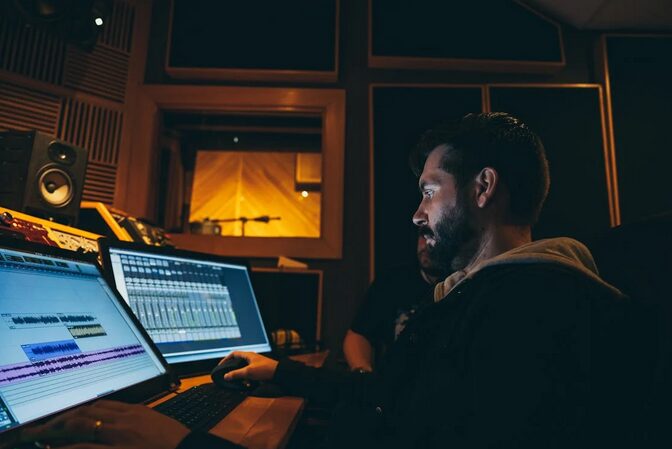Imagine walking into a music studio where the walls hum with creativity, but the musicians are nowhere in sight—replaced by algorithms and artificial intelligence. Welcome to the future of music production, where cutting-edge technology is not just an assistant but a collaborator, transforming how we create and experience sound. In this brave new world, automation transcends mere convenience; it opens doors to sonic possibilities previously confined to our wildest dreams. Whether you’re an aspiring artist, a seasoned producer, or simply a lover of melodies, understanding this evolution is essential. Join us as we explore how AI-driven tools are reshaping the landscape of music production and why you can’t afford to ignore these changes if you want your sound to stand out in an increasingly crowded digital arena.
AI and Machine Learning
Artificial intelligence (AI) and machine learning are making waves in music production. The technologies from www.unison.audio, for instance, can analyze vast amounts of data to identify patterns, making them incredibly useful for everything from composing melodies to mastering tracks. AI-driven tools like Amper Music and AIVA are already helping producers generate music quickly and efficiently. Imagine having an AI assistant that can suggest chord progressions, generate beats, or even create entire tracks based on your input. As AI continues to evolve, it will become an indispensable tool in every producer’s arsenal.
Remote Collaboration
The COVID-19 pandemic has accelerated the shift towards remote work, and music production is no exception. With tools like Splice, Soundtrap, and even Zoom, producers and musicians can collaborate from anywhere in the world. This trend is here to stay, making it easier for artists to work together without being in the same physical space. Remote collaboration tools allow for seamless sharing of projects, real-time editing, and communication, breaking down geographical barriers and fostering global creativity.
Sustainability in Music Production
As awareness of environmental issues grows, the music industry is also becoming more conscious of its ecological footprint. From using eco-friendly materials for physical media to adopting digital distribution methods, sustainability is becoming a key consideration. Producers are looking for ways to minimize waste, such as using energy-efficient equipment and reducing the use of non-recyclable materials. This trend towards sustainability will continue to shape the future of music production, encouraging more eco-friendly practices across the industry.
Virtual Reality (VR) and Augmented Reality (AR)

VR and AR are not just for gaming and entertainment; they’re also revolutionizing music production. With VR, producers can create and manipulate sounds in a 3D space, offering a more immersive and intuitive way to make music. Imagine donning a VR headset and using virtual instruments to create tracks in a completely immersive environment. AR, on the other hand, can enhance live performances by overlaying digital elements in the real world. These technologies will offer new creative possibilities and transform how we interact with music.
Enhanced Music Creation Software
Music creation software is constantly evolving, offering producers more powerful tools and features. Digital audio workstations (DAWs) like Ableton Live, Logic Pro, and FL Studio are becoming more sophisticated, with enhanced capabilities for sound design, mixing, and mastering. These advancements make it easier for producers to experiment and push the boundaries of their creativity. Expect to see more intuitive interfaces, advanced automation, and integrated AI features that streamline the production process and unlock new creative potential.
Blockchain and Music Rights
Blockchain technology is set to revolutionize the way music rights are managed and distributed. By providing a decentralized and transparent platform, blockchain can ensure that artists receive fair compensation for their work. Smart contracts can automate royalty payments, making it easier for musicians to track and receive payments. This technology empowers artists by giving them more control over their music and ensuring that they are fairly compensated for their creations.
The future of music production is full of exciting possibilities. With AI and machine learning, VR and AR, remote collaboration, sustainability, enhanced music creation software, and blockchain technology, the industry is poised for significant transformation. These trends will not only make music production more efficient and innovative but also more accessible and fair for artists around the world. Whether you’re a producer, musician, or simply a music enthusiast, keeping an eye on these emerging trends will ensure you stay ahead in this ever-evolving field. The future of music production is bright, and we can’t wait to see where it takes us.…


 After a long day at work, it can be challenging to relax. We may be stressed out from our jobs or worried about other things in our lives. Listening to music can help us forget about our troubles and relax. The right type of music can help slow our heart rate and breathing, and it can even lower our blood pressure. It makes music a great way to unwind after a long day.
After a long day at work, it can be challenging to relax. We may be stressed out from our jobs or worried about other things in our lives. Listening to music can help us forget about our troubles and relax. The right type of music can help slow our heart rate and breathing, and it can even lower our blood pressure. It makes music a great way to unwind after a long day. Listening to music is a great way to bond with other people. Whether you’re sharing your favorite songs with a friend or going to a concert together, music can help us connect with others. And research has shown that listening to music together can increase feelings of closeness and social connectedness. These are just a few of the reasons music is so popular. Whether it’s helping us relax, improving our mood, or enhancing our exercise, there are many benefits to listening to music.…
Listening to music is a great way to bond with other people. Whether you’re sharing your favorite songs with a friend or going to a concert together, music can help us connect with others. And research has shown that listening to music together can increase feelings of closeness and social connectedness. These are just a few of the reasons music is so popular. Whether it’s helping us relax, improving our mood, or enhancing our exercise, there are many benefits to listening to music.…